- Home
- Tracy Chevalier
The Virgin Blue Page 29
The Virgin Blue Read online
Page 29
He shrugged. ‘I was brought up Catholic, after all. Some things are impossible to leave behind entirely.’
Sylvie appeared in the distance, running in a zigzag, distracted by flowers or rabbits, so that she looked like a yellow butterfly flitting here and there. When she saw us she made a beeline for us.
‘Jean-Paul!’ she cried. She ran over to stand next to him.
He crouched beside her. ‘Bonjour, Mademoiselle,’ he said. Sylvie giggled and patted his shoulder.
‘Have you two been digging already?’ Mathilde picked her way through the rocks in pink slingbacks, swinging a yellow panier. ‘Salut, Jean-Paul,’ she said, grinning at him. He smiled at her. It occurred to me that if I had any sense I'd bow out and let them be together, give Mathilde some fun and Sylvie a father. It would be my own sacrifice, an atonement for my family's sins.
I stepped back. ‘I'm going to look for a place to bury the bones,’ I announced. I held out my hand. ‘Sylvie, do you want to come with me?’
‘No,’ Sylvie said. ‘I'm going to stay here with Jean-Paul.’
‘But – maybe your mother wants to be alone with Jean-Paul.’
I immediately realized I'd made a mistake. Mathilde began to laugh her high shriek.
‘Really, Ella, you are so stupid sometimes!’
Jean-Paul said nothing, but pulled a cigarette from his shirt pocket and lit it with a smirk on his face.
‘Yeah, I am stupid,’ I muttered in English. ‘Very, very stupid.’
We all agreed on the spot, a grassy patch next to a boulder shaped like a mushroom, not far from the ruins. It would always be easy to find because of the shape of the rock.
Jean-Paul began to dig while we sat nearby and ate lunch. Then I took a turn with the shovel, then Mathilde, until we'd made a hole about two feet deep. I began to lay the bones out. We'd dug room enough for two, and though Jean-Paul had found only the teeth among the ruins, I set them in their place as if the bones of the whole body were there too. The others watched, Sylvie whispering to Mathilde. When I finished I pulled a blue thread from the remains of the dress and put it in my pocket.
As I stood up Sylvie came over. ‘Maman said I should ask you,’ she began. ‘Could I bury something with Marie?’
‘What?’
Sylvie pulled the bar of lavender soap from her pocket.
‘Yes,’ I said. ‘Take it out of its wrapping first. Do you want me to put it in for you?’
‘No, I want to do it.’ She lay down next to the grave and dropped the soap into place. Then she stood up and brushed the dirt off her front.
I didn't know what to do next: I felt I should say something but didn't know what. I glanced at Jean-Paul; to my amazement he'd bowed his head, closed his eyes and was whispering something. Mathilde was doing the same, and Sylvie imitated them both.
I looked up and saw a bird high above us, fluttering its wings so that it hovered in place.
Jean-Paul and Mathilde crossed themselves and opened their eyes at the same time. ‘Look,’ I said, and pointed upwards. The bird was gone.
‘I saw it,’ Sylvie declared. ‘Don't worry, Ella, I saw the red bird.’
After we filled in the dirt we began piling small rocks on the grave to keep animals from taking away the bones, building it into a rough pyramid about eighteen inches high.
We'd just finished when we heard a whistle and looked around. Monsieur Jourdain was standing at the ruins, a young woman at his side. Even from that distance it was obvious she was about eight months pregnant. Mathilde glanced at me and we grinned. Jean-Paul saw the exchange and gave us a puzzled look.
Oh, God, I thought. I still have to tell him. My stomach tightened.
When they got close the woman stumbled. I stood frozen.
‘Mon Dieu! ’ Mathilde breathed.
Sylvie clapped her hands. ‘Ella, you didn't tell us your sister was coming!’
She reached me and stopped. We studied each other: the hair, the shape of the face, the brown eyes. Then we stepped together and kissed the other's cheeks: one, two, three times.
She laughed. ‘You Tourniers always kiss three times, as if two were not enough!’
Late in the day we decided to come down from the mountain. We would have a drink at the bar, then go our separate ways: Mathilde and Sylvie to Mende, Elisabeth to her home near Alès, Monsieur Jourdain to his house around the corner from the mairie, Jean-Paul to Lisle-sur-Tarn. Only I didn't know where I was going.
Elisabeth and I walked together to the cars.
‘You will come stay with me?’ she asked. ‘Come now if you want.’
‘Soon. I have some – things to sort out. But I'll come in a few days.’
At the cars she and Mathilde looked at me expectantly. Jean-Paul looked off at the horizon.
‘Um, you go ahead,’ I said to them. ‘I'll get a lift with Jean-Paul. We'll see you there.’
‘Ella, you are coming home with us, aren't you?’ Sylvie asked anxiously. She began to pat my arm.
‘Don't worry about me, chérie.’
When the cars disappeared down the road Jean-Paul and I found ourselves on either side of his car. ‘Can we take the roof down?’ I asked.
‘Bien sûr.’
We unhooked the clasps on each side, rolled the roof back and fastened it. When we were done, I leaned against the side of the car and rested my arms along the top ridge of the window. Jean-Paul leaned against the other side.
‘I have something to tell you,’ I said. I swallowed the lump in my throat.
‘In English, Ella.’
‘Right. OK. In English.’ I stopped again.
‘You know,’ he said, ‘I had no idea I could be so miserable about a woman. It has been almost two weeks you go away. Since then, I can't sleep, I can't play piano, I can't work. The old women tease me at the library. My friends think I am crazy. Claude and I fight over stupid things.’
‘Jean-Paul, I'm pregnant,’ I said.
He looked at me, his whole face a question. ‘But we –’ He stopped.
I thought again about lying, about how much easier it would be to lie. I knew he would see through it.
‘It's Rick's,’ I said softly. ‘I'm sorry.’
Jean-Paul took a deep breath. ‘There is nothing to be sorry about,’ he said in French. ‘You wanted to have a baby, yes?’
‘Oui, mais –’
‘Then there is nothing to be sorry about,’ he repeated in English.
‘If it's with the wrong person, there's plenty to be sorry about.’
‘Does Rick know?’
‘Yes. I told him the other night. He wants us to move to Germany.’
Jean-Paul raised his eyebrows.
‘What do you want to do?’
‘I don't know. I have to think about what's best for the baby.’
Jean-Paul pushed himself off the car and walked to the other side of the road, where he stood looking out over the fields of broom and granite. He reached over, picked a stalk of broom and squeezed the bitter yellow flowers between his fingers.
‘I know,’ I whispered so he wouldn't hear me. ‘I'm sorry. It's too much, isn't it?’
When he came back to the car he looked resolute, even stoic. This is his finest hour, I thought. Unexpectedly I smiled.
Jean-Paul smiled back at me.
‘What's best for the mother is usually what's best for the baby,’ he said. ‘If you are unhappy the baby will be also.’
‘I know. But I've lost sight of what's best for me. I wish I at least knew where home was. It's not in California anymore. And Lisle – I don't think I can go back there. Not right now. Or Switzerland. Certainly not Germany.’
‘Where do you feel most comfortable?’
I looked around.
‘Here,’ I said, ‘Right here.’
Jean-Paul opened his arms very wide.
‘Alors, tu es chez toi. Bienvenue.’
EPILOGUE
I stared up at the sky, a pale blue washed out by late Se
ptember sun. The Tarn was still warm; I lay on my back, arms stroking out from my sides, breasts flattened, hair floating in the river like leaves around my face. I looked down: my belly was just beginning to push above the water. I cupped the mound with my hands.
There was a rustling of paper from the bank.
‘What happened to Isabelle?’
‘I don't know. Sometimes I think she left Moutier and returned here to the Cévennes. She found her shepherd and had her baby, and lived happily ever after. She even went back to being Catholic so she could worship the Virgin.’
‘Happy ending.’
‘Yes. But you know, I don't think that's what really happened. More often I think she died starving in a ditch somewhere, fleeing from the Tourniers, a baby dead in her womb, forgotten, her grave unmarked.’
There was silence.
‘But you know the worst fate, even worse than that, and yet the most likely?’
‘What can be worse than that?’
‘She lived with it. She stayed in Moutier and lived with her daughter's body under the hearth for the rest of her life.’
Isabelle kneels at the crossroads. She has three choices: she can go forward, she can go back, or she can remain where she is.
—Help me, Holy Mother, she prays. Help me to choose.
A blue light surrounds her, giving her solace for the briefest moment.
I sat up abruptly, crouching on the long smooth rock of the river bed, my breasts regaining their roundness. The baby had woken and begun to wail like a kitten. Elisabeth lifted him from his blanket on the river bank and guided his mouth to her breast.
‘Has Jean-Paul read this?’ She patted the manuscript next to her.
‘Not yet. He will this weekend. It's his opinion I'm the most nervous about.’
‘Why?’
‘It's the most important to me. He has definite opinions about history. He'll be very critical of my approach.’
Elisabeth shrugged. ‘So? It's your history, after all. Our history.’
‘Yes.’
‘Now, what about the painter you were telling me about? Nicolas Tournier.’
‘The red fish, you mean.’
‘What?’
‘Nothing. He has a place, no matter what Jean-Paul thinks.’
Jacob reaches the crossroads and finds his mother on her knees, bathed in blue. She does not see him and he watches her for a moment, the blue reflected in his eyes. Then he looks around and takes the road leading west.
ACKNOWLEDGEMENTS
I would like to thank the following people (in alphabetical order, that great leveller) for their help: Juliette Dickstein; Jonathan Drori; Susan Elderkin; Jonny Geller; James Greene; Kate Jones; my cousin Jean Kleiber, who first told me about chimneyless farms and other things Swiss; Lesley Levene; Madame Christine Martinez of Florac, who without knowing it gave me a crash course in French village life; and Vicky Singer.
Most useful were Montaillou and The Peasants of Languedoc by Emmanuel Le Roy Ladurie, The Return of Martin Guerre and Society and Culture in Early Modern France by Natalie Zemon Davis, Protestants du Midi, 1559–1598, by Janine Garrisson, and Moutier à travers les âges by Ph. Pierrehumbert.
Most of the places in the book may exist, but none of the people does.
HISTORICAL NOTE
The 16th-century Protestant Reformation originated with Martin Luther in Germany. One of his associates, John Calvin, moved to Geneva, where he trained preachers in his beliefs, based on a pious, disciplined life as well as the direct worship of God without the need for a priest as intermediary. These preachers fanned out across France, spreading the ‘Truth’, as Calvinist teachings were known. They quickly converted many in the cities and among the French nobility.
It took longer to penetrate remote rural regions such as the Cevennes, a mountainous area in southern France. Once preachers arrived there, however, many peasants converted to the Truth and began worshipping secretly, in barns and in the forest, until they were able to kick out the local Catholic priests and occupy the churches. Catholic churches were taken over in several Cevenol villages in 1560 and 1561, and Huguenots (as French Protestants came to be known) became dominant in the Cevennes.
In 1572, thousands of Huguenots who had gathered for a royal wedding were slaughtered. This Massacre of St Bartholomew launched waves of persecution that spread all over France, forcing many Huguenots to emigrate. Some peace was restored by the Edict of Nantes which protected Protestant rights, but troubles developed again after Louis XIV revoked the edict in 1685, dispersing Huguenots across Europe. In the early 18th century groups of Huguenots in the Cevennes rose against the French government in what is known as the Camisard rebellion, but were unsuccessful and had to worship clandestinely once again.
About the Author
TRACY CHEVALIER grew up in Washington, DC. She moved to England in 1984, and worked for several years as a reference book editor. In 1994 she graduated from the MA course in creative writing at the University of East Anglia. Her first novel, The Virgin Blue, was chosen by WH Smith for its Fresh Talent promotion in 1997. Girl with a Pearl Earring was longlisted for the Orange Prize in 2000. Tracy Chevalier lives in London with her husband and son.
Visit www.AuthorTracker.com for exclusive information on your favorite HarperCollins author.
Praise for Girl with a Pearl Earring:
‘Beautifully written, mysterious and almost unbearably poignant – a magical experience.’
DEBORAH MOGGACH
‘It has a slow, magical current of its own that picks you up and carries you stealthily along … a beautiful story, lovingly told by a very talented writer.’
Daily Mail
‘A wonderful novel, mysterious, steeped in atmosphere, deeply revealing about the process of painting … truly magical.’
Guardian
‘Ultimately absorbing … suspended in a particular moment, it transcends its time and place.’
New Yorker
Also by Tracy Chevalier
GIRL WITH A PEARL EARRING
FALLING ANGELS
THE LADY AND THE UNICORN
Copyright
This novel is entirely a work of fiction.
The names, characters and incidents portrayed in it are
the work of the author's imagination. Any resemblance to
actual persons, living or dead, events or localities is
entirey coincidental.
Harper
An imprint of HarperCollinsPublishers
77–85 Fulham Palace Road,
Hammersmith, London W6 8JB
www.harpercollins.co.uk
First published in Great Britain by
the Penguin Group 1997
Copyright © Tracy Chevalier
Tracy Chevalier asserts the moral right to
be identified as the author of this work
A catalogue record for this book is
available from the British Library
Set in PostScript Linotype Giovanni by
Rowland Phototypesetting Ltd, Bury St Edmunds, Suffolk
All rights reserved under International and Pan-American Copyright Conventions. By payment of the required fees, you have been granted the non-exclusive, non-transferable right to access and read the text of this e-book on-screen. No part of this text may be reproduced, transmitted, down-loaded, decompiled, reverse engineered, or stored in or introduced into any information storage and retrieval system, in any form or by any means, whether electronic or mechanical, now known or hereinafter invented, without the express written permission of HarperCollins e-books.
EPub Edition © 2006 ISBN: 9780007324347
About the Publisher
Australia
HarperCollins Publishers (Australia) Pty. Ltd.
25 Ryde Road (PO Box 321)
Pymble, NSW 2073, Australia
http://www.harpercollinsebooks.com.au
Canada
HarperCollins Canada
2 Bloor Street Ea
st - 20th Floor
Toronto, ON, M4W 1A8, Canada
http://www.harpercollinsebooks.ca

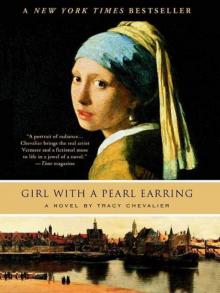 Girl With a Pearl Earring
Girl With a Pearl Earring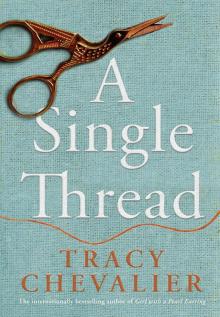 A Single Thread
A Single Thread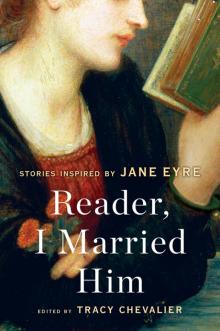 Reader, I Married Him: Stories Inspired by Jane Eyre
Reader, I Married Him: Stories Inspired by Jane Eyre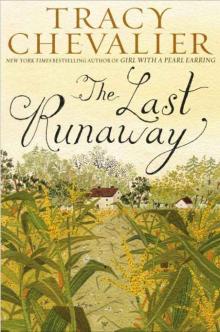 The Last Runaway
The Last Runaway Burning Bright
Burning Bright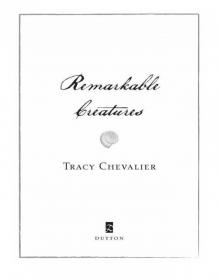 Remarkable Creatures
Remarkable Creatures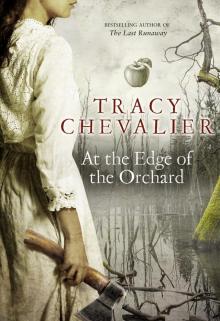 At the Edge of the Orchard
At the Edge of the Orchard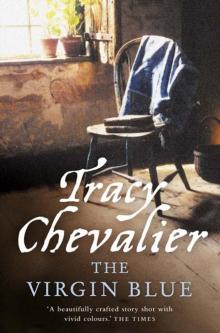 The Virgin Blue
The Virgin Blue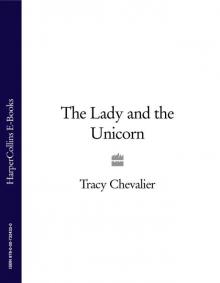 The Lady and the Unicorn
The Lady and the Unicorn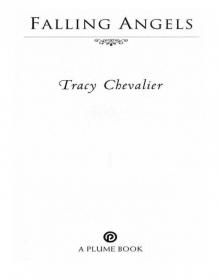 Falling Angels
Falling Angels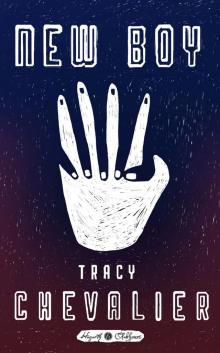 New Boy
New Boy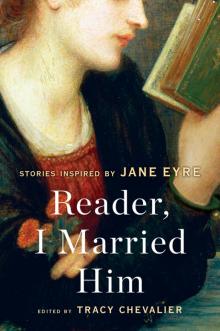 Reader, I Married Him
Reader, I Married Him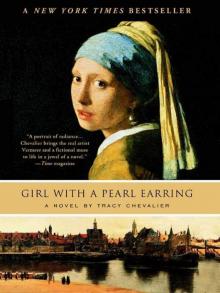 Girl with a Pearl Earring, The
Girl with a Pearl Earring, The